- Details
- Flash Memory
Delivering a glimpse into the future of data center architectures, KIOXIA America, Inc. (formerly Toshiba Memory America, Inc.), has successfully demonstrated an E3.S full-function development vehicle in conjunction with a leading server original equipment manufacturer (OEM). This breakthrough Enterprise and Datacenter SSD Form Factor (EDSFF), also known as E3, is designed to maximize system density, efficiency and simplicity.

Being developed in the SNIA SFF-TA-1008 technical work group, in which KIOXIA is an active member, EDSFF E3.Short (E3.S) and E3.Long (E3.L) solutions are the future of SSD storage for servers and All Flash Arrays (AFAs) in cloud and enterprise data centers. Featuring one common connector, this innovative form factor standard for PCIe® technology-based devices, such as NVMe SSDs, graphics processing units (GPUs), and network interface cards (NICs), enables a complete array of footprint, power and capacity options, offering unprecedented system flexibility. In addition, EDSFF E3.x drives break free from the design limitations of the 2.5” form factor by supporting higher power budgets (up to 40 watts) and better signal integrity to deliver the performance promised by PCIe Gen 5.0 and beyond, optimizing future generations of server and storage systems. Furthermore, these future-forward SSD designs feature improved thermal characteristics that address the cooling challenges that come with game-changing speeds.
0 Comments- Details
- Flash Memory
T-FORCE, the gaming brand of TEAMGROUP, today announces the new CARDEA Ceramic C440 Solid State Drive with latest and ultra-fast M.2 PCIe Gen4x4 interface. It is the first of its kind in the industry to be made with ceramic composite cooling materials, and obtained Taiwan Utility Model Patent (No. M595313). The snow-white ceramic has a unique texture, and the special aerospace ceramic can achieve excellent heat dissipation effect. Not only bringing a new color into the gaming world, it also unleashes an ultimate performance with read/write speed of 5,000/4,400 MB/s.

With NVMe 1.3 specification, T-FORCE CARDEA Ceramic C440 Solid State Drive creates a higher standard for M.2 solid state drive by using the latest, ultra-fast M.2 PCIe Gen4x4 interface to achieve a sequential read/write speed of 5,000/4,400 MB/s. The use of aerospace ceramic composite cooling materials not only provides excellent heat dissipation, but also reduces heat by 18% when the case is equipped with a fan. At the same time, it is also lightweight and thin, anti-electromagnetic interference, high temperature resistant, extreme temperature shock resistant. Besides, it is made with environmentally friendly materials, which is RoHS compliant. The combination of CARDEA Ceramic C440’s snow-white heat spreader and the golden T-FORCE displays a trendy style. It will be even more eye-catching if it is matched with a white motherboard and case. The thickness is only about 1mm which perfectly showcase the aesthetics of thinness of T-FORCE CARDEA Ceramic.
0 Comments- Details
- Flash Memory
Kioxia Holdings Corporation, the world leader in memory solutions, announced today that it expects to complete its acquisition of LITE-ON Technology Corporation’s Solid State Drive (SSD) business, Solid State Storage Technology Corporation and its affiliated companies on July 1, 2020. The company entered into a share purchase agreement on August 30, 2019 in connection with the acquisition. Both parties are now following the necessary procedures in order to close the transaction on July 1, 2020.
As the demand for SSDs continues to increase with rapid expansion expected in the coming years with the rise of digital transformation, this acquisition will allow Kioxia to strengthen its SSD business significantly and help meet the projected growth in demand.
“At Kioxia we are continuing to accelerate our focus on our SSD business, especially in the growing cloud computing arena,” said Nobuo Hayasaka, President and CEO of Kioxia Holding Corporation. “This is an exciting acquisition for us. Solid State Storage Technology Corporation’s excellent capabilities together with our leading flash memory and SSD technology will bring significant opportunities for synergy and enable us to further deliver value-added solutions to our customers. We will enhance our leading position in the global SSD market and work to develop new ICT infrastructure driven by AI, 5G, IoT and Cloud data centers.”
0 Comments- Details
- Flash Memory
Samsung Electronics America today introduced its second-generation quad-level cell (QLC) flash drive, the 870 QVO SATA SSD, that is setting a new standard for high-capacity consumer storage. Featuring an industry-leading capacity of up to eight terabytes (TB), the new SSD delivers an uncompromising mix of speed, storage capacity and reliability for mainstream and professional PC users.
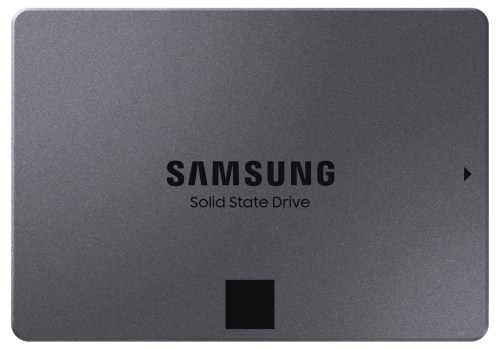
In the past, consumers have had to choose between SSDs – which provide superior performance – and HDDs, which traditionally offer greater capacity. Samsung’s 870 QVO SSD, however, is able to reliably offer the best of both worlds, making it an optimal choice for mainstream PC users who prioritize performance and value, as well as for professional users who require high levels of capacity.
0 Comments- Details
- Flash Memory
Lexar, a leading global brand of flash memory solutions, today announced the new Lexar SL200 Portable SSD.
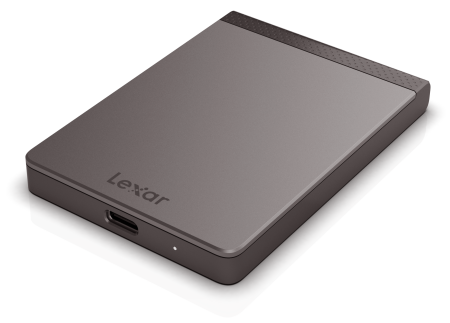
The family line of SSD products continues to expand and grow stronger with this latest addition to the SSD portfolio. This portable drive lets you take your data on-the-go, so you’re covered in the field or the office. To keep your data secure, it’s drop-, shock-, vibration-resistant, and features an advanced security solution with 256-bit AES encryption. The sleek SL200 has a premium finish available in 512GB and 1TB of storage space. It also displays more than adequate transfer speeds of up to 550 MB/s and a write speed of up to 400 MB/s. It’s easy to connect to your system using the included USB Type-C to USB Type-C or USB Type-C to Type-A cable, and it’s ready to use.
0 Comments- Details
- Flash Memory
OWC; a leading zero emissions Mac and PC technology company and one of the world's most respected providers of Memory, External Drives, SSDs, Mac & PC docking solutions and performance upgrade kits announces the new OWC Envoy Express, the world's first Thunderbolt 3 certified bus-powered portable storage enclosure that makes for effortless DIY projects. Shorter than a ballpoint pen and weighing only 3.3 ounces, the rugged anodized aluminum pocket-sized enclosure and unique laptop mounting system are ready for go-anywhere use.
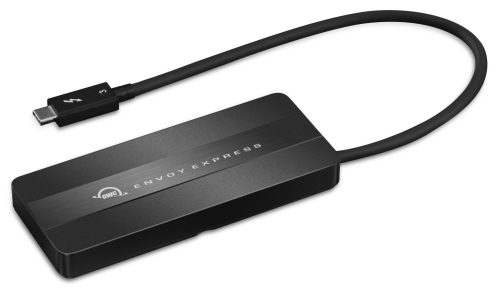
History-Making DIY Pocket-Sized Storage Solution
While small in form, the OWC Envoy Express is big news. For the first time ever in the history of Thunderbolt™, users can buy a bus-powered Thunderbolt™ certified enclosure and install their own drive in it. Finally, a DIY kit that allows users to break free of pre-configured choice limits in order to build a pocket-sized storage solution that meets their specific needs. And rebuild it anytime those needs change. Equally revolutionary is the included slide mount. This surface-safe removable drive holder allows the user to slide the Envoy Express onto the back of a laptop screen for out-of-the-way mobile use convenience. More options. More usability. More functionality….first and only from OWC.
- Details
- Flash Memory
Western Digital today announced new solutions that provide the foundation for next-generation data infrastructures designed around Ultrastar NVMe SSDs and supercharged by NVMe-oF. Building upon the company's innovative design and integration capabilities – from NAND Flash to storage platforms – the new dual-port, performance Ultrastar DC SN840 NVMe SSDs and in-house RapidFlex NVMe-oF controllers are standalone solutions that combine to create the new OpenFlex Data24 NVMe-oF Storage Platform, a new shared storage JBOF (Just a Bunch of Flash) enclosure that extends the value of NVMe to multiple hosts over a low-latency Ethernet fabric network. These new solutions further expand Western Digital's data center portfolio to help customers transition to higher efficiency NVMe SSDs and more advanced shared storage architectures to meet the evolving demands of performance-driven applications and workloads.

In today's global digital economy, microseconds count. As hyperscale cloud and enterprise data centers constantly work to remove bottlenecks to ensure uncompromised performance and availability of essential applications, while also keeping pace with unprecedented data growth, customer adoption of NVMe and NVMe-oF solutions continues to accelerate. Industry analyst firm IDC expects hyperscalers, OEMs and end-user IT organizations to continue to transition away from legacy SATA and SAS interfaces, with NVMe on track to reach more than 55 percent of total enterprise SSD units shipped in 2020 and grow at a 2018-2023 CAGR of 38 percent.
0 Comments- Details
- Flash Memory
This week at the HPE Discover Virtual Experience, KIOXIA America, Inc. (formerly Toshiba Memory America, Inc.), will showcase the critical role its flash-based solid state drives (SSDs) are playing in addressing the challenges of today – while accelerating the digital transformation of tomorrow.
KIOXIA offers the industry’s broadest SSD product portfolio and has been collaborating with HPE to create best-in-class storage solutions for years. KIOXIA SSDs can be found in HPE’s server and storage solutions, including HPE ProLiant® Servers.
At the virtual event, KIOXIA America will highlight its broad range of products that are optimizing HPE solutions. These products include a new series of PCIe® 4.0 SSDs, the first-ever 24G enterprise SAS SSDs built on SAS-4 technology, and a new class of SSDs that are faster and cost-effective replacements for SATA SSDs. In addition, KIOXIA America will conduct a speaking session focused on SSD trends and technology for high-performance storage solutions built for HPE ProLiant servers.
0 Comments- Details
- Network Storage
QNAP Systems, Inc., a leading computing, networking, and storage solution innovator, today launched the TS-x53D 2.5GbE NAS series, available in 2, 4, and 6-bay models. With a quad-core 2.0 GHz processor and dual 2.5GbE connectivity, the TS-x53D series not only provides modern businesses with an excellent 2.5GbE NAS solution, but also satisfies gamers as ample storage for their vast game collections. This reliable and secure NAS series delivers high cost-efficiency by offering more value-added capabilities, including PCIe expansion, multi-cloud backup, cloud storage gateway, 4K HDMI output, and more. The TS-x53D series comes with a 3-year standard warranty, and can be extended up to 5 years with a purchased warranty extension.
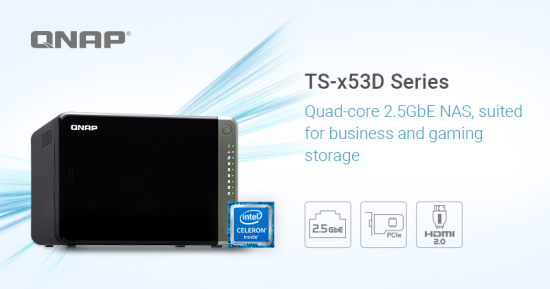
“The TS-x53D allows users to upgrade network speeds from 1 Gigabit to 2.5 Gigabit using existing CAT5e cables, and to streamline file backup and sharing, video streaming, and even gaming storage,” said Jason Hsu, Product Manager of QNAP. “QNAP’s QSW 10GbE/Multi-Gig switch also provides a perfect addition to create a high-speed, future-proof collaborative network environment.”
0 Comments- Details
- Flash Memory
In collaboration with ASUS TUF Gaming Alliance, TEAMGROUP today announces the launch of T-FORCE CARDEA II TUF Gaming Alliance M.2 Solid State Drive and T-FORCE DELTA TUF Gaming Alliance RGB Gaming Solid State Drive(5V). Certified and rigorously tested by the TUF Gaming Alliance, the exterior design inherits the original pattern elements and adds the TUF Gaming camouflage logo to showcase gaming colors with strong military style. It can be synchronized with ASUS AURA SYNC motherboard lighting control software. With the comprehensive evolution of accessing performance, it is definitely the first choice for gamers who love military style.
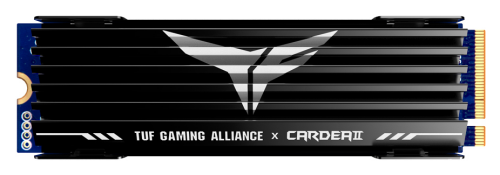
T-FORCE CARDEA II TUF Gaming Alliance Solid State Drive is the first M.2 SSD certified by ASUS TUF Gaming Alliance. With TEAMGROUP T-FORCE’s patented gaming cooling fin, PCIe Gen3x4 high speed interface and NVMe 1.3 protocol, the sequential read/write speed is up to 3400/3000 MB/s, and random read/write speed is up to 180K/160K IOPS, offering up to 1TB of capacity. The buit-in smart algorithm contains a variety of management mechanisms such as the garbage collection function, Wear-Leveling technology and ECC (Error Correction Code) function, which can improve the efficiency and reliability of data transfer, and prolong the service life perfectly.
0 Comments
